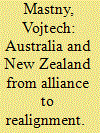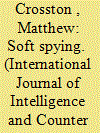| Srl | Item |
| 1 |
ID:
143681


|
|
|
|
|
| Summary/Abstract |
Sino-American debates about the emerging security order in the Asia-Pacific region have not paid enough attention to the perspectives of lesser powers. Among them, Australia and New Zealand, as developed nations increasingly integrated with Asia, are potentially most influential. A historical analysis of their different yet complementary security perceptions and policies suggests diminishing relevance of traditional security structures in the post-Cold War international environment. In the Asia-Pacific region, the established US-centered bilateral alliances are expedient for upholding the status quo, but less so for managing the necessary change. Australia has been at the forefront of promoting the growth of new multilateral regional structures, based on the Association of Southeast Asian Nations (ASEAN), whereas New Zealand has been most successful in developing mutually satisfying relations with China. As desirable strategic partners of both China and the United States, the two middle powers are best suited to promoting a realignment based on common economic interests and values, rather than on balance of power, thus bridging the supposed gap between ‘Asian’ and ‘Western’ values. A Trans-Pacific Partnership including China may eventually become a centerpiece of regional realignment that could serve not only trade but also security by ensuring increasing interaction and understanding among people at all levels―the best safeguard against a slide to military rivalry.
|
|
|
|
|
|
|
|
|
|
|
|
|
|
|
|
| 2 |
ID:
122587


|
|
|
| 3 |
ID:
138804


|
|
|
|
|
| Summary/Abstract |
Despite Hollywood romanticizing about the fictional escapades of various James Bonds and Jason Bournes, one of the most prevalent forms of modern intelligence activity is arguably the least emphasized: economic and industrial espionage. Aimed at garnering financial and innovation advantages for countries seeking greater influence in a highly globalized world, this activity is not merely about economic policy. It also serves as a de facto proxy military rivalry: states maneuver to outperform, outwit, and “outstrategize” their competitors across all spheres of profitable activity via this lesser “INT.” Like the more ubiquitous concept of soft power, soft spying (a term interchangeable with “economic and/or industrial espionage”) is the avoidance of war while still achieving dominance, wherein states engage one another in myriad transactions and contestations, and global futures can rise or fall without a single bullet being fired. Soft spying is an under-emphasized aspect of globalization and the ever-increasing transnational technical connectivity among nations. More importantly for Americans, structural/cultural flaws in the world of business reveal how the United States might arguably always end up more victim than perpetrator in this globally pervasive activity.
|
|
|
|
|
|
|
|
|
|
|
|
|
|
|
|